It’s the opening night of U2’s Joshua Tree 2017 world tour, and Bono is gamely “trying to find some magic in the concrete temple” of Vancouver’s BC Place stadium. It takes him longer than you might expect: the five-song warm-up set that leads into The Joshua Tree itself betrays some first-night rustiness, and there are moments when the diminutive frontman with the elephantine ego seems uncharacteristically subdued, uneasy, even a little insecure. “Was that all right?” he asks the crowd as he leaves the stage two hours later, seemingly unsure of what sort of answer he’ll get in response.
There are good reasons for that uncertainty, reasons that might go some way to explaining why a band who always prided themselves on evolution and reinvention have suddenly decided to gaze into the middle-distance of their own history. Classic-album tours have become commonplace in recent years, but while the financial rewards are plentiful, they’re also a tacit admission that your audience is less invested in your future than your past – anathema for a group like U2, who have always conflated being the biggest band in the world with being the best.
It was on The Joshua Tree that they first grasped that mantle, but 30 years later, they’re struggling to figure out what size amounts to in an industry that’s changed beyond all recognition. The Joshua Tree sold 25m copies in a pre-digital age and is by any measure one of the most popular albums of all time; their most recent effort, 2014’s Songs of Innocence, was thrust on to 500m iTunes accounts as part of an ill-judged publicity stunt, and is merely one of the most pervasive. As a touring band, U2 still have a licence to print money, but as a creative force, a question mark continues to hang over them.
The Edge has cited the Trump effect as one reason for revisiting The Joshua Tree, pointing out that the album, “was written in the mid-80s, during the Reagan-Thatcher era of British and US politics. It was a period when there was a lot of unrest. Thatcher was in the throes of trying to put down the miners’ strike; there was all kinds of shenanigans going on in Central America. It feels like we’re right back there, in a way. I don’t think any of our work has ever come full circle to that extent.”
If that’s the case, you could argue that 1993’s Zooropa provides more fertile thematic ground to explore the fake news, demagoguery and data analytics that actually swept Trump to power, but that iteration of the band is neither as beloved nor as iconic as The Joshua Tree’s outsider’s-eye-view of America’s shared symbols, history and heritage (it also sold 18m fewer copies). No, if the idea is to make U2 great again, to restore them to their former capacity as rock’s great mediators in an age of hyper-partisanship and polarisation, it could only be The Joshua Tree.
The striking visuals that accompany the main set – directed by Anton Corbijn and shown on a curved 200ft screen that is the largest and highest-resolution ever used for a concert tour – further complement the album’s mythic ideal of America as a shining city on a desert mesa. Where the Streets Have No Name is set against a stark, slow-moving tracking shot of a bleached-out desert highway, while Trip Through Your Wires sees a Stetson-hatted cowgirl defiantly painting the stars and bars on to a dilapidated wooden shack. On With Or Without You, against the dramatic backdrop of an 8K-resolution mountain range, the band even seem to physically inhabit its nooks and crannies while stormclouds gather overhead. By U2’s own standards, this is a relatively stripped-back production, but the effects can often be quietly spectacular.
Trump, inevitably, is the elephant in the room, and true to The Edge’s rationale for embarking on this tour, certain tracks, like Bullet the Blue Sky, or the never-before-played Red Hill Mining Town – written about the 1984 miners’ strike but eerily prescient of the social and economic angst felt by many American voters – really do feel newly resonant. Elsewhere, there are not-so-subtle contrasts drawn between US and Canadian refugee policies (“While others close their doors, yours are open”) as well as the double-take of Exit being introduced by footage from the 1950s TV series Trackdown, in which a huckster named Trump tries to convince people that he alone can save them from the apocalypse by building a wall around their town. It will be interesting to see how that rhetoric translates to the red-state heartlands of Texas, Virginia and Kentucky, where audiences may not take kindly to a band of multi-millionaire Clintonites disparaging their Dear Leader, but for the time being, it seems Trump has done for U2 what he’s already done for artists, journalists and late-night talkshow hosts alike: given them a nemesis, and a renewed sense of purpose.
What they do with it, of course, will be the next big test. Tonight’s second and final encore pointedly concludes with The Little Things That Give You Away, a new track from their long-delayed Songs of Experience album, and clearly intended as a gentle reminder, after two hours of basking in past glories, that the group are still a going creative concern. Evidently, there’s still some anxiety there, some gnawing desire to keep proving themselves to themselves. After 40 years as a band, you have to admire them for it.

